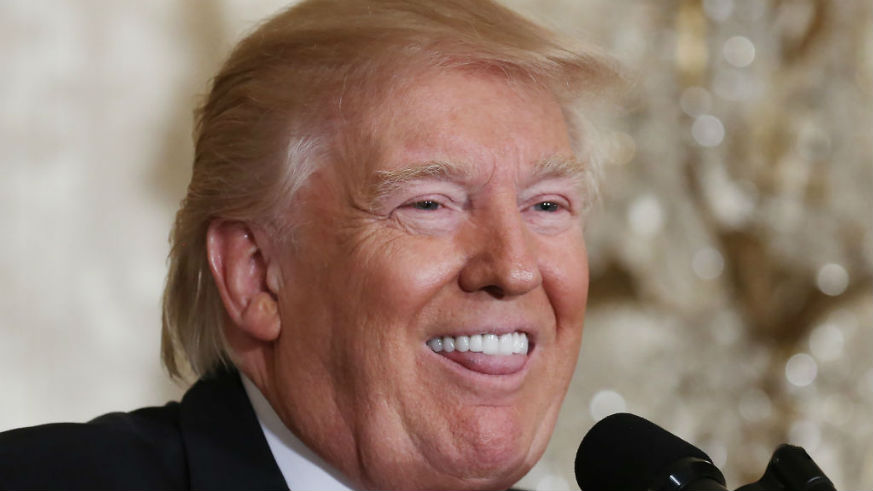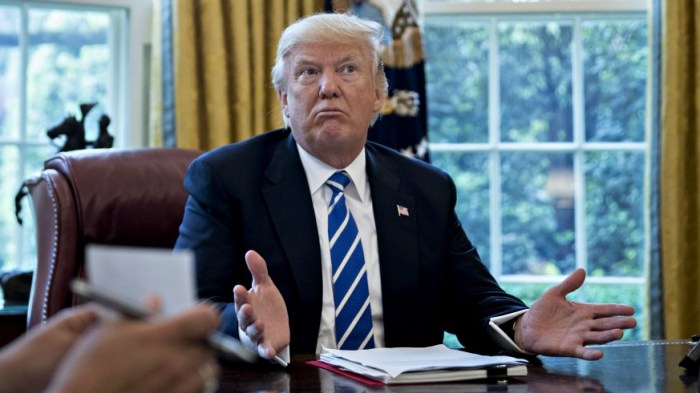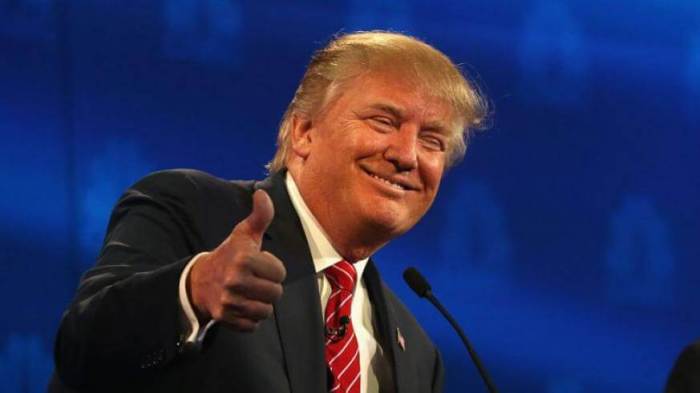Yesterday was a big day in politics (bet you’ve heard that one before). President Trump announced that the U.S. would recognize Jerusalem as the capital of Israel, and the gradual process of moving our embassy there from its long-standing presence in Tel Aviv will commence. Whether you agreed with it or not, something else came up for public debate: Did Donald slur his words?
Social media took notice that towards the end of his speech, Trump’s delivery became rather shaky to say the least, closing with a questionable, “…and God bless the United Shhtahhes.” People had their theories, but one that stuck was rather odd: Dentures.
“As disturbing as it was today to watch Donald Trump add fuel to the Middle East conflict, it was even more disturbing to watch the conflict between Donald Trump’s teeth and his tongue,” Trevor Noah said on “The Daily Show.”
Trump announces that the U.S. will recognize Jerusalem as Israel’s capital and all hell breaks loose between his tongue and teeth. #DentureDonald
Full episode: https://t.co/DJZoI9j8Yo pic.twitter.com/nCciSWuJJ1— The Daily Show (@TheDailyShow) December 7, 2017
“This used to happen to my grandfather all the time,” he continued over the crowd’s laughter. “Dentures would start falling out, and then he wouldn’t be able to finish his sentence. That’s what would happen!”
“Ok, think about it,” Noah prompted. “Have you ever seen Trump eat an apple or a pear or fruits or vegetables of any kind? Have you? Huh?”
The web took full advantage, and #DentureDonald began trending.
This could go on all night. #DentureDonald pic.twitter.com/PWX4yoniv8
— Mojopo (@mojopo) December 7, 2017
My new favorite hashtag #DentureDonald pic.twitter.com/jaXOecr89k
— Edward OZ (@itsEdwardOZ) December 7, 2017
Hey #denturedonald
Guess who has a beautiful set of his own pearly whites?#YouNeverBestObama pic.twitter.com/C6gMvrobMQ— S.O.S. USA (@DeliaMacD1) December 7, 2017
Some are using dentures to explain the awkward moment last month when Trump stopped a speech to locate a bottle of water and take a sip.
This makes SO MUCH more sense now. Right before he takes a sip, he adjusts his dentures. #DentureDonald pic.twitter.com/hYEixJfVWd
— Sidney Applebomb (@SidneyApplebomb) December 7, 2017
What about his mental health?
CNN reports that the official term for slurred speech is “dysarthria” due to weakened muscles. It can be caused by a number of things: medication, dental work (such as dentures) and more serious problems like brain damage from a stroke, Parkinson’s or tumors.
The debate over Trump’s mental health has been ongoing, especially after a group of experts who studied his behavior concluded that he shows symptoms of paranoia and personality disorders.
On a recent segment of MSNBC, former Harvard Medical School Assistant Professor of Psychiatry Dr. Lance Dodes analyzed Trump’s sporatic outbursts on Twitter: “The simple explanation for it, which people don’t want to hear, is that he’s not in control of himself. This is what we mean when we say that somebody is becoming psychotic or is briefly psychotic.”
The Dangerous Case of Donald Trump: 27 Psychiatrists and Mental Health Experts Assess a President made it to the New York Times Bestseller List, and one psychologist leading the efforts to remove Trump from office, John Gartner, even petitioned to declare him as mentally ill, therefore requiring the president to relieve himself of his duties.
However, others are calling these diagnoses unfair and irresponsible. Under the “Goldwater Rule,” the American Psychiatric Association (APA) prohibits practicing psychiatrists from offering public opinions or diagnoses on someone they have not personally examined.
Professionals in the field prove to be divided on the matter. The American Psychoanalytic Association (APsaA), which is separate from the APA, wrote in a statement that “psychoanalysts should offer relevant psychoanalytic insights to aid the public in understanding a wide range of phenomena in politics, the arts, popular culture, history, economics, and other aspects of human affairs.”
“American Psychoanalytic Association encourages members to speak out in public and share our expertise and has a different ethical standard and code from the American Psychiatric Association,” Chicago-based psychiatrist Prudence Gourguechon told Yahoo News. “Our ethics code hasn’t changed.”
The White House responds
The White House claims that Trump’s slurred speech was caused by a dry throat, and when pressed on whether or not health problems could be to blame, they stuck to their claim.
“His throat was dry,” White House spokesman Raj Shah said. “There’s nothing to it.”
Whatever it is, here’s to Trump keeping his mind, his thirst — and his teeth — in check for the years to come.



















